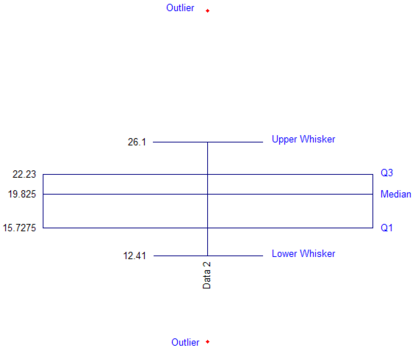Box and Whiskers Plot: Calculations Help
Quartiles
The quartiles are calculated as shown below. The data below has been sorted in ascending order. There are 28 data points.

The program uses:
- y = p(n+1) = j + g
where p the percentile (0.25 for Q1 or .075 for Q3), n = number of data points, j is the integer portion of y, and g is the decimal portion of y.
Q1
- y = 0.25*(28+1) = 7.25
- j = 7 which is the seventh point in the data in ascending order
- g = 0.25 which is the fraction to multiple the difference between Xj+1 and Xj (or in this case, the difference between point 8 and point 7).
- Q1 = 15.62 + 0.25(16.05 – 15.62) = 15.7275
Q3
- y = 0.75*(28+1) = 21.75
- j = 21 which is the seventh point in the data in ascending order
- g = 0.75 which is the fraction to multiple the difference between Xj+1 and Xj (or in this case, the difference between point 22 and point 21).
- Q1 = 22.08 + 0.75(22.28 – 22.08) = 22.23
Median
The median is calculated using Excel’s built-in median function (Median).
Whiskers
The upper whisker is the largest value in the data set that is less than the upper limit = Q3 + 1.5(Q3 – Q1)
The lower whisker is the smallest value in the data set that is greater than the lower limit = Q1 – 1.5(Q3 – Q1)
Plot of Q1, Q3, Median, Whiskers and Outliers

